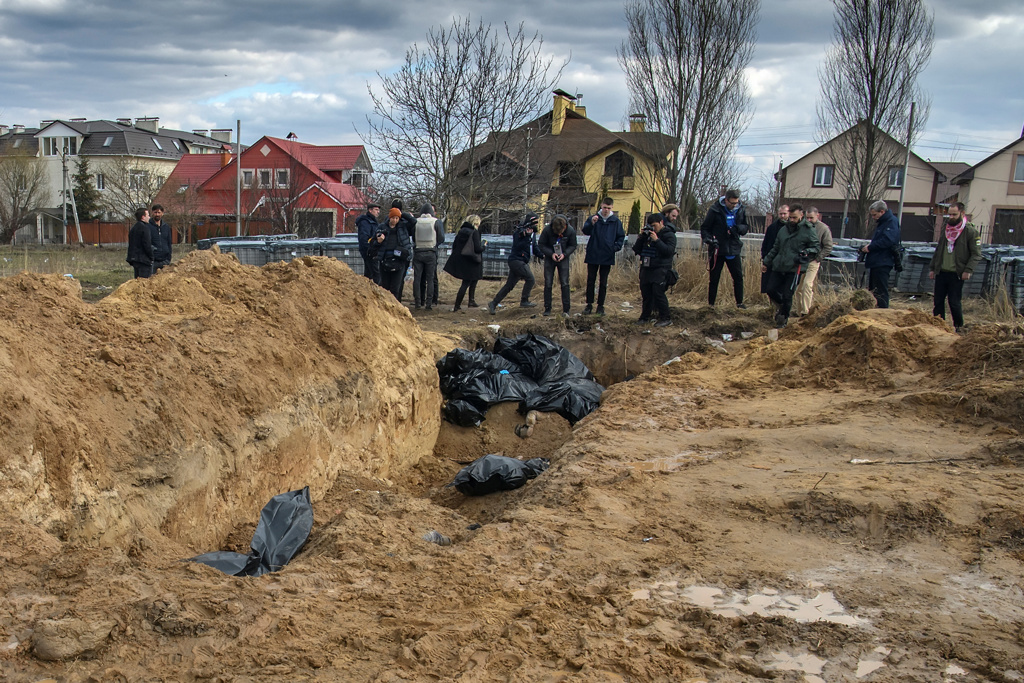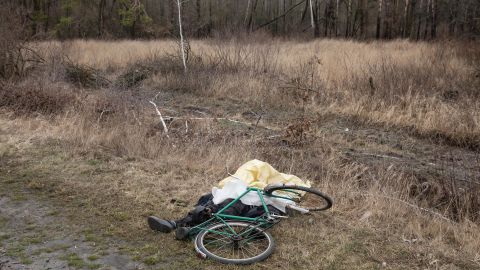Western outrage, new sanctions, and promised state-of-the-art weapons came too late to save the man found shot dead next to his bike on a grassy bank outside Kyiv.
The man was pictured in a weekend of horrific imagery from Ukraine.
布查大屠殺 製裁再升級?CNN爆:西方快沒招了

烏克蘭奪回基輔地區控製權,發現西北地區的布查鎮有數百平民遭殺害,曝屍街頭。(圖/路透社)
烏克蘭發現基輔西北地區的小鎮布查(Bucha)鎮有數百平民曝屍街頭,澤倫斯基指控俄軍種族滅絕,犯下戰爭罪,同時也呼籲西方對俄羅斯施以更嚴厲的製裁。不過CNN記者卻說,西方已經無計可施,無論是什麽樣的製裁懲罰,普京都無動於衷,且也無法挽救烏克蘭民眾的生命。
CNN資深記者科林森(StephenCollinson)專文指出,西方在外交、經濟、文化和體育等各層麵的空前嚴厲製裁,已經無法影響普京,因為普京的政治地位十分安全,他絲毫不擔心被貼上戰犯的標籤,除非是發生重大政治變革,否則他受審的可能性微乎其微。
麵對烏克蘭軍隊頑強抵抗,普京似乎能夠接受俄軍的巨大損失,且也願意承受因入侵所帶來的製裁懲罰,即便這確實對俄羅斯經濟和寡頭帶來嚴重的衝擊,但作為威懾的工具,明顯沒有效果。
除此之外,俄羅斯擁有全球最大的核軍火庫,西方不願冒著與俄羅斯發生災難性衝突的風險,冒險直接幹預烏克蘭,如設立禁飛區拯救平民,而普京也深知這一點;從外界看來,這場戰爭對俄羅斯是場從軍事、外交,再到經濟的多重災難,但普京的目的僅是盡可能摧毀烏克蘭,隻為在官媒上塑造一場勝利,讓自己成為繼希特勒和斯大林之後,“21世紀無法被嚇倒的獨裁者”。
因此從很多方麵來看,普京和西方在玩一場“不對稱的遊戲”,西方的製裁是基於俄羅斯利益與侷限的邏輯看法,但對普京卻不盡然。
布查鎮的慘況引發俄軍潛在戰爭罪疑慮,各方試著建立正式機製,以追究普京及其追隨者的責任,但在現有的國際體係下,會使製定享有全球合法性的機製更加複雜,例如俄羅斯會在聯合國安理會投下反對票等企圖。
另外,歐盟製定新的製裁措施,也可能對俄羅斯造成嚴重打擊,不過考慮到能源短缺和通膨等考量,即便法國總統馬克宏(EmmanuelMacron)已經表態支持禁止俄羅斯煤炭、石油進口,但如德國等歐洲大國是否會跟進支持,仍有很大的不確定性。
就短期而言,可以看到兩個問題,普京是否還會受西方施壓影響?而在此之前,還會有多少烏克蘭平民死亡?
The West is running out of ways to punish Putin
https://www.cnn.com/2022/04/05/politics/putin-ukraine-war-atrocities-western-punishment/index.html
 Analysis by Stephen Collinson, CNN; April 5, 2022
Analysis by Stephen Collinson, CNN; April 5, 2022Western outrage, new sanctions, and promised state-of-the-art weapons came too late to save the man found shot dead next to his bike on a grassy bank outside Kyiv.
The man was pictured in a weekend of horrific imagery from Ukraine.

He was one of many blameless civilians whose destiny randomly collided with President Vladimir Putin’s barbaric invasion. Scenes being revealed as Russian troops pull back from Kyiv are causing searing flashbacks to atrocities last visited on Ukrainians by the Nazis in World War II.
This is one snapshot of the bloody price Ukrainian civilians are paying for Putin’s obsession with Russia’s Cold War humiliation, and it encapsulates how global responses to crimes against humanity – short of military action – struggle to keep pace with a vicious on-the-ground war.
The sense of revulsion about what is happening in Ukraine produced new momentum to hold Russia accountable on Monday. The European Union and Ukraine launched a new probe into potential war crimes in the Kyiv suburb of Bucha, where bodies were found strewn in the street. Members of Congress called on President Joe Biden to speed up the flow of weapons into Ukraine to beat back the invasion. The European Union is facing rising pressure to accept what would be a painful economic hit by totally cutting off Russian oil and coal exports.
Biden reacted to the growing catalog of inhumanity on Monday by calling for more sanctions and for a war crimes trial to take place against Putin.
“You may remember I got criticized for calling Putin a war criminal,” Biden said. “He is a war criminal. This guy is brutal.”
But the awful tragedy being revealed in Ukraine is that all of the measures the West is prepared to contemplate to punish Moscow and impact the long-term course of the war cannot do much to save civilians being targeted now.
And it is questionable whether any of the potential responses to the bloodlust by Putin’s troops will sway the ruthless Russian leader anyway.
The reflex for leaders to offer horrified condemnations, to demand accountability and to lash out at Putin is understandable. It’s also critical for the world not to be numbed into acceptance.
But the West is unlikely to halt Putin’s campaign of atrocities in the short term – especially since the Russian leader has proven immune from moral outrage. And given the scale of carnage already committed, including attacks on apartment blocks, hospitals and bomb shelters, he also appears to have long passed the point of any restraint.
New momentum for fresh punishments for Russia followed a weekend in which harrowing footage emerged of civilians shot dead, some execution-style, in Bucha. A CNN team also observed a mass grave in the town on Sunday and witnessed the removal of bodies from a basement on Monday.
Ukraine warned Monday that such scenes may be the “tip of the iceberg,” and President Volodymyr Zelensky said worse atrocities were being uncovered.
“There is already information that the number of victims of the occupiers may be even higher in Borodyanka and some other liberated cities,” said Zelensky, who will address the UN Security Council on Tuesday morning.
“In many villages of the liberated districts of the Kyiv, Chernihiv and Sumy regions, the occupiers did things that the locals had not seen even during the Nazi occupation 80 years ago.”
The toughest sanctions ever, Russia’s new status as a global pariah and its cultural, diplomatic, economic and sporting isolation haven’t stopped the Kremlin strongman yet. Given Putin’s apparently secure political position, he shows no concern at being labeled a war criminal, and the chances of him standing trial are remote barring staggering political change in Russia.
Russia’s contempt for the notion of accountability, meanwhile, shone through its absurd claims that scenes of the decomposed bodies being pulled from the basement and images of civilians apparently killed execution-style were staged by the Ukrainians.
Armed with the world’s largest stockpile of nuclear warheads, Putin understands that the West is unwilling to intervene directly in Ukraine and risk a disastrous clash with Russia with measures like a no-fly zone to save civilians.
He is offering a lesson in why other dictators might consider pursuing nuclear arms. The kind of Western interventions to save civilians in places like Kosovo or Libya are prohibited in Ukraine, simply because of the implied power of the Russian leader’s arsenal – and his saber rattling earlier in the war.
Eighty years after dictators like Adolf Hitler in Germany or Joseph Stalin in the Soviet Union spread terror inside and outside their countries, Putin is creating an awful new spectacle for the 21st century – that of a dictator who cannot be deterred.
Putin’s willingness to absorb punishments already clamped on Russia over the invasion gave him a special kind of impunity. Sanctions on the Russian economy and oligarchs may have a debilitating impact in the long term. But they have clearly failed as a tool of deterrence.
The Russian leader has also appeared willing to tolerate heavy casualties among his troops in the face of heroic resistance from Ukrainian forces. The recalibration of Russian strategy to trying to consolidate control of eastern regions may, however, show even Putin can be moved by events over time.
From the outside, the war is a military, diplomatic and economic disaster for Russia after its failure to seize key objectives. But it can still be a perverse success for Putin if his goal is simply to destroy as much of Ukraine as possible and create a victory parade for Russian state media.
So in many ways, he’s playing an asymmetric game with the West, whose sanctions and punitive measures are based on a more logical view of Russia’s interests and its own limitations.
Still, the White House reacted to the horror emerging from Ukraine by promising to quicken the pace of military, humanitarian and economic aid to Kyiv.
“The images from Bucha so powerfully reinforce now is not the time for complacency,” US national security adviser Jake Sullivan said Monday.
Such help could shorten the war and alleviate attacks on civilians in weeks and months to come. But Putin has been besieging and bombarding Ukrainian cities for weeks. Millions of people were already driven out of the country into Western Europe as refugees.
Momentum is also growing for some kind of formal mechanism to hold Russian leaders accountable for war crimes. Former Ukrainian Prime Minister Arseniy Yatsenyuk told CNN’s Jake Tapper on Monday that the invasion was the biggest disaster in Europe since World War II, and merited a system of justice similar to the Nuremberg Trials of Nazi war criminals.
“We need to prepare right now. We need to urgently launch a kind of joint investigative group in order to be prepared to bring to justice Putin and to see Putin sitting behind … bars.”
But the nature of the post-Cold War international system would complicate the establishment of a system that enjoyed global legitimacy. Russia, for instance, would be certain to veto any attempt to involve the United Nations with its Security Council vote. China would also seek to derail any effort to impose accountability for human rights abuses given its own repression of Uyghur Muslims that the United States has branded a genocide.
Still, the difficulty of bringing Putin to justice does not mean that Russians lower in the chain of command cannot be investigated, though the International Criminal Court in The Hague doesn’t conduct trials in absentia. The organization does, however, already have investigations in Ukraine, which has accepted its jurisdiction even though it’s not a member of the court.
One potentially significant new blow against Russia could come from Europe as the European Union draws up new sanctions. French President Emmanuel Macron backed a ban on Russian coal and oil exports to the EU as soon as this week.
But it’s doubtful whether other big powers, including Germany, would go that far, given the energy shortages and spikes to already high inflation that would result.
Such a move would undoubtedly make strides in starving funding for the war in Ukraine.
But in the shorter term, it would also beg two questions: Is Putin even vulnerable to pressure anymore? And how many more Ukrainian civilians will die until he is?